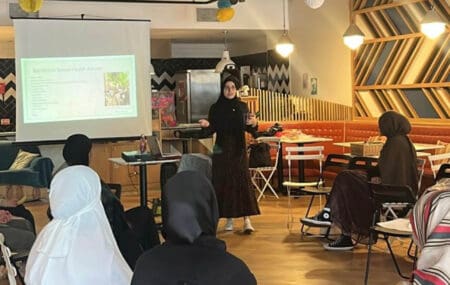
The Role of Upbringing in Shaping Muslim Women’s Access to Sexual Health
In many communities, discussions around sexual and reproductive health are often avoided or seen as taboo, leaving women without the knowledge and support they need to manage their health. This silence, driven by cultural and societal influences, perpetuates barriers to accessing vital information. Recently, Hajer Adrwish, a UK-based relationship and sexual health educator, led a workshop offering Muslim women a space to openly address these topics, share their challenges, and explore solutions. This workshop highlighted not only the importance of education on women’s health but also how upbringing shapes our understanding and access to such knowledge.
Defining sexual and reproductive health
In her workshop, Hajer emphasised that sexual and reproductive health goes beyond physical well-being. It includes the right to access accurate information, the ability to make informed choices about one’s body, and the support needed to thrive in both spiritual and physical health.
As Hajer articulated, “We were created to thrive, and to do this, we need to understand our health as Muslims.” She pointed out that this understanding is both a right and a responsibility — a form of amanah, or trust, that Muslim women must uphold. However, achieving this understanding can be complicated by cultural norms and varied religious interpretations. These factors can either support or hinder women’s access to necessary health services and education.
Barriers to accessing information and services
One of the key issues discussed was the difficulty many Muslim women face in accessing accurate and comprehensive sexual health information. One attendee shared her experience growing up in a school where menstruation and sexual health were rarely discussed openly:
“It was something we kept under the rug, especially when praying. There was this unspoken rule that it was not to be discussed openly, which made it difficult to know where to turn for accurate information.”
This silence can leave young girls unprepared for the changes they experience during puberty, often turning to unreliable sources for information. “I made sure to talk to my younger sister about menstruation so she wouldn’t learn it from the wrong sources,” another participant emphasised. She added, “I wanted her to have the right information, unlike many of us who were left to figure it out on our own.”
In many Muslim communities, women’s health is still shrouded in silence, and this lack of dialogue often leads to a reliance on misinformation. This has long-term effects on decision-making, self-esteem, and overall health outcomes, leaving many women feeling isolated and uncertain about their bodies.
To tackle this, one sister suggested the need for more exposure and events like this workshop, where women can learn in a supportive environment. “Not knowing where to access information shouldn’t be an issue in today’s world,” another participant added. “We need more exposure, more events, and more conversations like this one.”
Actionable Tip: Hosting educational sessions at local Masājid or community centres for parents and children to attend, would help deconstruct myths and clarify Islamic perspectives. These sessions could feature guest speakers who are experts on the topic, presenting the information in an accessible manner that aligns with Islamic teachings and fosters open, stigma-free dialogue.
The role of puberty in Islamic obligations
In Islam, puberty marks the start of religious obligations such as prayer, fasting, and modesty. Yet, as the workshop revealed, menstruation is often seen as the only marker of puberty, which overlooks other significant physical changes like growth spurts, breast development, and increased libido. Without comprehensive education, navigating these transitions can be confusing, spiritually overwhelming, and isolating for young Muslim women.
“Periods have been the main marker of puberty, but there are many markers,” Hajer pointed out. “We need to understand all aspects of puberty, not just menstruation, to fully observe our Islamic obligations.” This deeper understanding is vital; it empowers young Muslim women to embrace their changing bodies and faith-based responsibilities.
With the right support and education, puberty can become a journey that nurtures both faith and personal growth. It can turn what is often feels confusing and heavily stigmatised into a time of confidence in one’s body and identity.
Actionable Tip: Start early. While there’s no set age to begin talking to children (boys and girls!) about sexual health, starting the conversation early can slowly build on their understanding and ease the transition. You can use teachable moments, like talking about sexual health topics when they arise naturally in conversations around school, news or everyday life. These moments are perfect for opening up natural, Islamic value-driven conversations, and allow for myths and misconceptions to be addressed.
Challenging pre-Islamic taboos
The workshop explored how pre-Islamic attitudes toward women continue to influence modern-day taboos. Historically, women were often seen as commodities, a perspective that still lingers in some cultural practices today.
One participant reflected on these deep-seated beliefs, explaining that breaking the hymen was often likened to “breaking the seal.” It was precisely these harmful practices that Islam sought to reform.
Hajer reminded participants that menstruation should not be a source of shame but an acknowledged and respected aspect of womanhood. She also highlighted the courtesies Islam extends to women during menstruation, such as being excused from prayer and fasting. “These courtesies are not limitations,” Hajer explained, “but acknowledgments of the physical and spiritual needs of women.” She urged women to view these practices through a lens of compassion rather than restriction.We often associate exclusion with being disliked or seen as unworthy by others, and we can subconsciously project that onto Allah ﷻ, thinking He may not like us or deems us unworthy. But the Prophet ﷺ has reassured all of us by dismissing that notion. Our natural cycles, which Allah has given as a blessing and with wisdom, is simply part of decree. When our period starts, it has nothing to do with His pleasure or displeasure. In fact, we are rewarded for submitting to and obeying Him. Whether fasting and praying when He commands, or refraining when He prohibits, both acts are done out of loving obedience to our Merciful Lord.
Actionable Tip: Encourage trauma-informed care, where sensitivity is shown toward past experiences that women may have had. Discussions should be non-judgmental and supportive. It should also be approached thoughtfully and in a compassionate way that supports self-advocacy and empowers individuals to take control of their health and re-centre the correct Islamic view.
Moving forward: Creating a culture of open dialogue
The workshop concluded with a shared understanding of the need for open dialogue and accessible education on Muslim women’s health. Participants expressed a strong desire for continued workshops and discussions where women can learn in environments free from judgment or shame. Echoing the sentiment of many, one attendee said,
“We need more spaces like this – spaces where we can speak freely, share our stories, and gain the knowledge we need to navigate our health with confidence and clarity.”
As women continue to challenge these taboos, they build a community of support where topics like menstruation, sexual health, and fertility are no longer shrouded in shame but embraced with confidence and clarity.
Actionable Tip: Once you’ve started the conversation, keep it going. Look for opportunities to deepen the dialogue through additional discussions, workshops, or events that invite more community members to participate.
Conclusion
In a society where misinformation and stigma cloud the realities of women’s health, creating safe spaces is essential. By breaking the silence, challenging outdated taboos, and fostering open dialogue, we can empower women to take control of their health and well-being, fulfilling the amanah that Hajer so eloquently described.
“This is our amanah, and we must care for it with knowledge, compassion, and confidence.”

